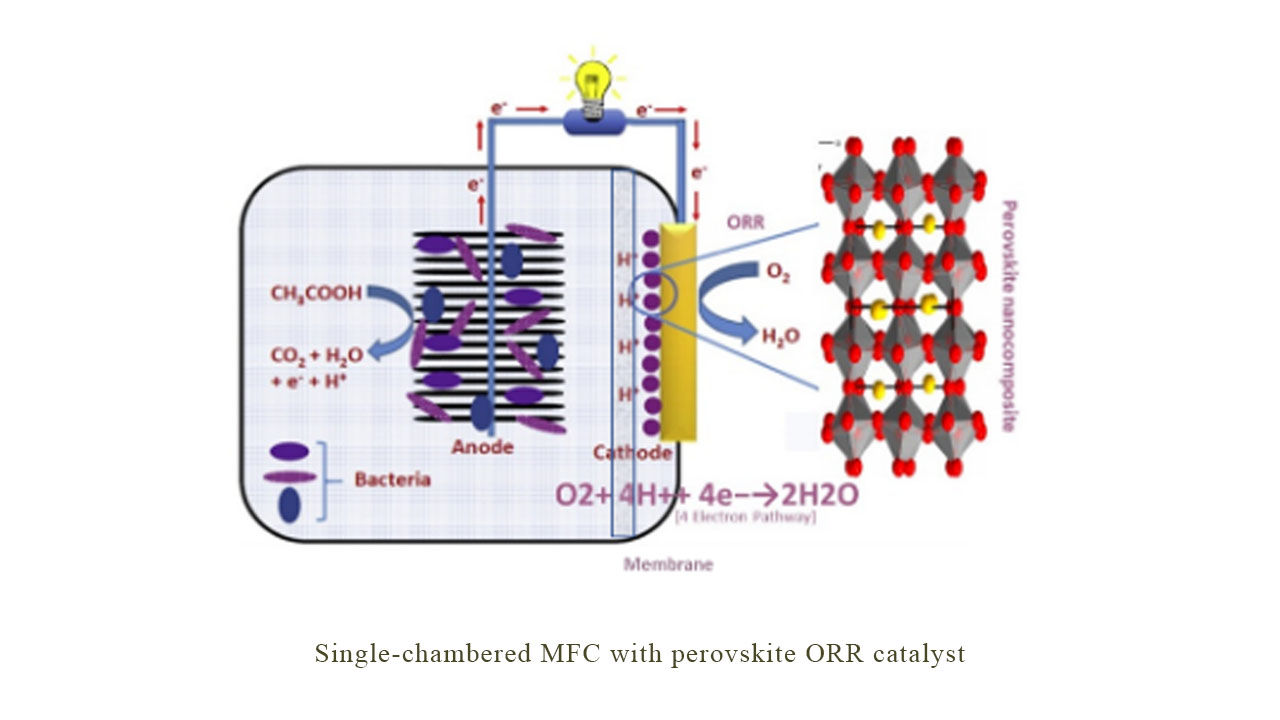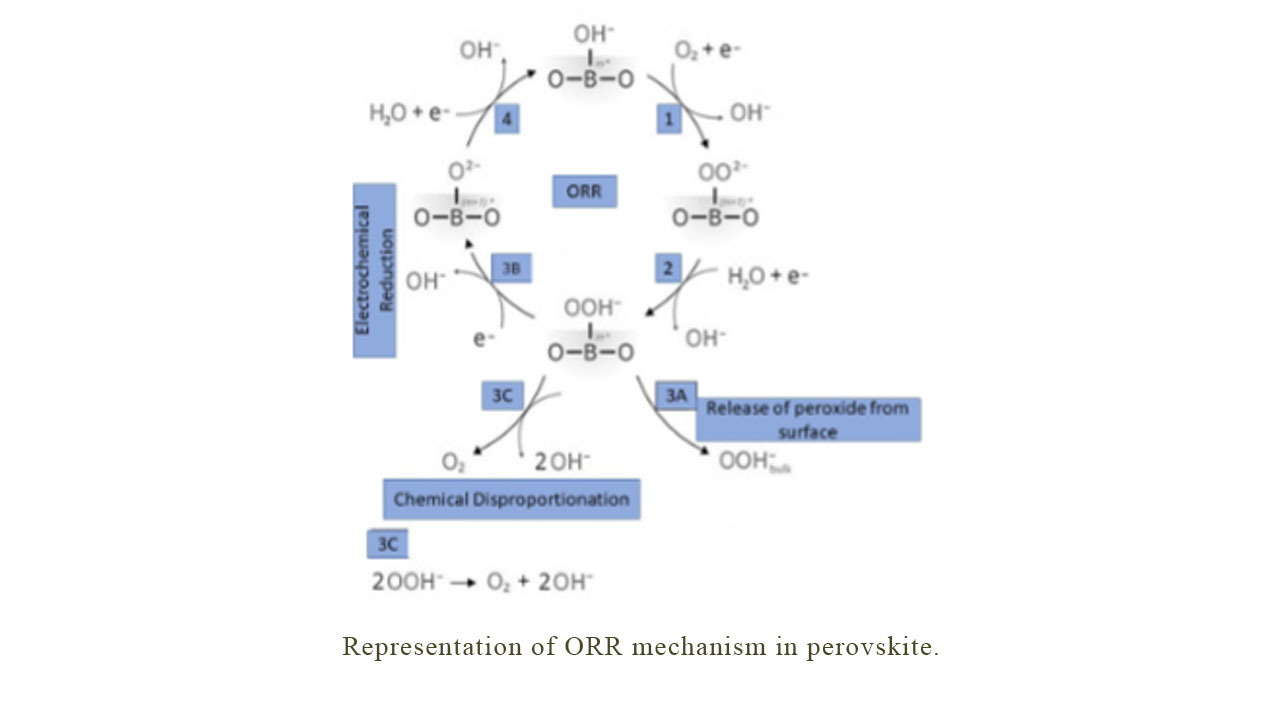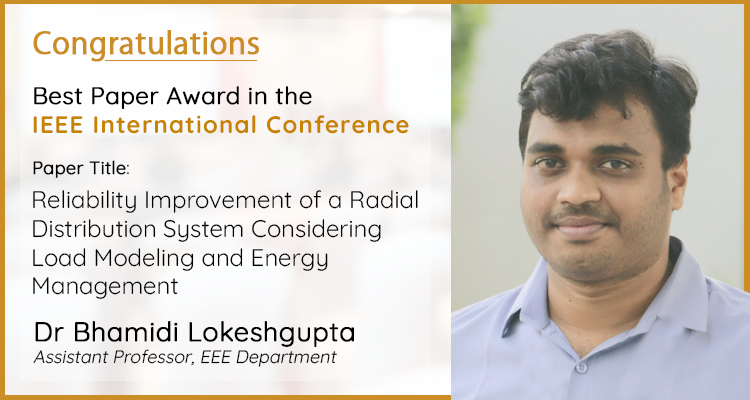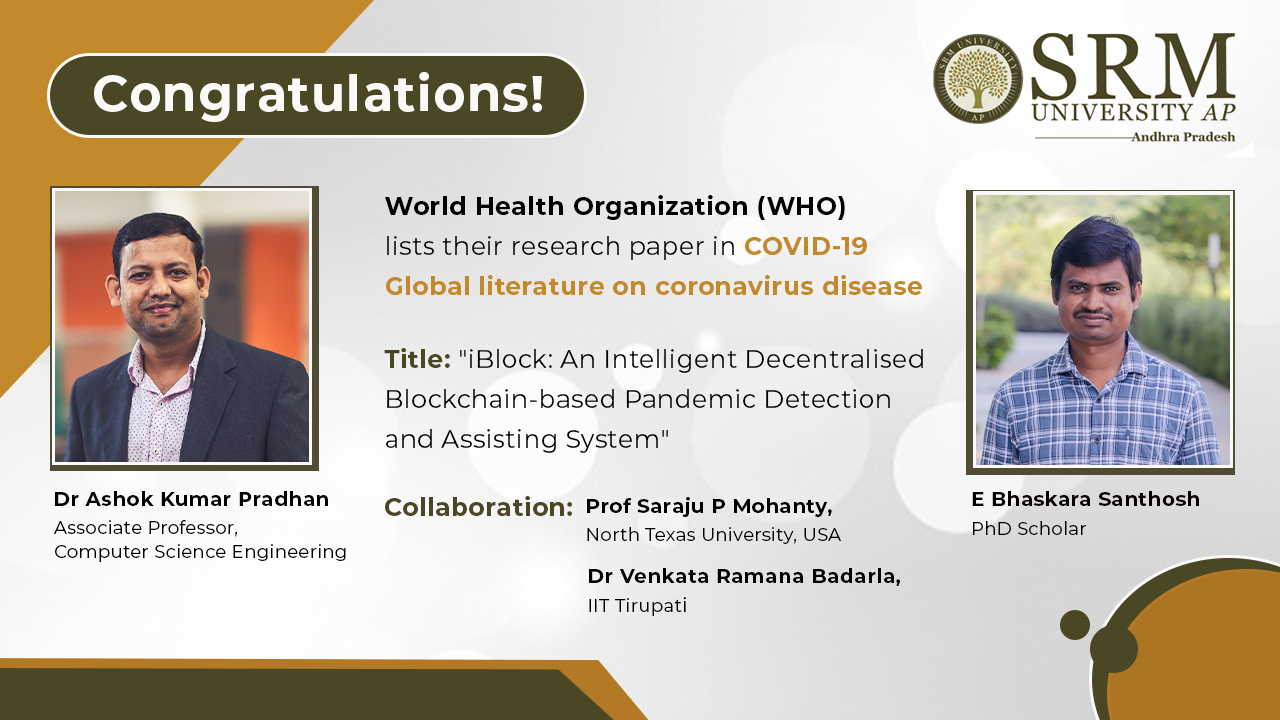SRM-AP All News
ALL News
- E-Cell organised induction programme on entrepreneurial leadership April 12, 2022
The Department of Entrepreneurship and Innovation organised an induction programme, “Ushering the Next Era- Innovation, Leadership & Entrepreneurship”, to give the students a comprehensive overview of the emerging possibilities in entrepreneurship. Various students who have successfully initiated their own start-up ideas have also shared their experiences.
Udayan Bakshi, Associate Director- Entrepreneurship, introduced the students to the country’s business landscape and rendered them a brief picture of the start-up ecosystem of India. Substantiating his arguments using facts and figures, he instigated the students to develop an innovative spirit and don the role of entrepreneurs capable of transforming the face of the nation.
Prof B V Babu, Dean- School of Engineering and Sciences, presided over and spoke about the legacy of the university. He also reminded the students of the ample avenues left open for students to explore and experience. “We aspire to offer a wholesome learning experience to our students through a gamut of courses ranging from engineering to fine arts and management”, he said. When it comes to entrepreneurship, there are pioneering ventures like Hatchlab Research Centre and Next Tech Lab to support and motivate young researchers who can promote the commercial research culture.
Prof Prakash Jadhav, Head- Innovation, Design and Entrepreneurship Academy (IDEA), enlightened students on the inevitability of trying their hands at entrepreneurship as the country demands more job providers than job seekers to satiate the needs of the growing population. He also coaxed the students to contribute to the Make in India vision by exhibiting their innovatory leadership skills.
A few of our students, Lucklin Medimpudi, Jathin, Divi Gnanesh, Lakshman Tatikonda, Manaswini Surusomayajula, and Himansh Mudigonda, who have displayed their entrepreneurial acumen through ingenious start-up ideas went on to share their experiences and encouraged the students to become part of the E-Cell.
The session was later taken over by Manideep Surusomayajula who elaborated on various initiatives such as the student communities, exploratory competition, and the experiential learning platforms, the E-Cell has embarked on to train our students to perform to the best of their abilities in the industry. There are numerous platforms ranging from international collaborations to global mentorship programmes and women-led start-up initiatives for students to innovate themselves as individuals and as a team.
Mr Bakshi wrapped up the event by referring to the triumphant stories the SRM AP E-cell has witnessed. He reinstated the university’s vision to build strong professionals who can assume the position of entrepreneurial leaders and play a crucial role in nation-building. SRM AP aims to give rise to dozens of skilful professionals having the ability to motivate and inspire sweeping changes that can help the nation progress.
Continue reading → - Introducing perovskite-based catalyst for microbial fuel cell April 8, 2022
Microbial fuel cells (MFCs) are biochemical systems producing green energy through the microbial degradation of organic contaminants in wastewater. The Oxygen Reduction Reaction (ORR) that takes place at MFC cathode decides the overall output of energy generation. Hence, the selection of ORR catalyst becomes pivotal in MFC fabrication for its efficiency and cost effectiveness. Gopa Nandikes P, PhD Scholar, Department of Environmental Science, proposes perovskite-based nanocatalyst as an excellent replacement to Platinum in his paper “Perovskite-Based Nanocomposite Electrocatalysts: An alternative to Platinum ORR Catalyst in Microbial Fuel Cell Cathodes”. The paper is published in ‘Energies Journal’ having an Impact Factor of 3.04.
The paper comprehensively summarises all the studies conducted with perovskite-based ORR catalyst in MFC, its unique reaction mechanism and the synergistic effect with carbon. The paper also throws light into various challenges and prospects to further improve the ORR activity of perovskite-based catalysts.
Abstract of the Research
Microbial fuel cells (MFCs) are biochemical systems having the benefit of producing green energy through the microbial degradation of organic contaminants in wastewater. The efficiency of MFCs largely depends on the cathode oxygen reduction reaction (ORR). A preferable ORR catalyst must have good oxygen reduction kinetics, high conductivity, and durability, together with cost-effectiveness. Platinum-based electrodes are considered a state-of-the-art ORR catalyst. However, the scarcity and higher cost of Pt are the main challenges for the commercialization of MFCs; therefore, in search of an alternative, cost- effective catalysts, those such as doped carbons and transition-metal based electrocatalysts have been researched for more than a decade. Recently, perovskite-oxide based nanocomposites have emerged as a potential ORR catalyst due to their versatile elemental composition, molecular mechanism, and the scope of nanoengineering for further developments. In this article, we discuss various studies conducted and opportunities associated with perovskite-based catalysts for ORR in MFCs. Special focus is given to a basic understanding of the ORR reaction mechanism through oxygen vacancy, modification of its microstructure by introducing alkaline earth metals, electron transfer pathways and the synergistic effect of perovskite and carbon. At the end, we also propose various challenges and prospects to further improve the ORR activity of perovskite-based catalysts.
- J Abbas Mohammed grabbed a staggering offer of CTC 44.91 LPA April 8, 2022
J Abbas Mohammad was in a state of absolute euphoria as the news reached him. He has been placed with Predli, a top-performing AI company, with a staggering offer of CTC 44.91 LPA. With one more achievement to flaunt, SRM is surging ahead with an endless list of placement offers and achievement stories. Abbas is a final year student of the Department of Computer Science Engineering who has already demonstrated his calibre by grabbing a seat at UC Berkeley through the Semester Abroad Programme. His sheer will and dedication have always helped him break the records and fly to further heights.
SRM University-AP happened to be the perfect place that shaped him up to pursue the career of his dreams. Our collaboration with leading enterprises in the world turned out to be an excellent avenue for many to walk ahead to a horizon of opportunities. The Department of Corporate Relations & Careers Services is also doing an amazing job in training the students and encouraging them to apply for the best available prospects. Let us listen to Abbas as he pours out his excitement.
“I am truly delighted to have received this high-paying placement offer. And all of this became possible with the exposure I received from my university. I kept abreast of the latest technologies in the software industry and applied them through practical projects as part of our co-curricular activities in classrooms and university labs such as the Next Tech Lab. The experienced faculty and specially curated curriculum we follow here will always give an extra edge to the students. I am indeed thankful to Dr Sujith Kalluri and Dr Priyanka for assisting me on several occasions”, he said.
“It is the Semester Abroad Program at UC Berkeley, which allowed me to build a strong international networks, that eventually led to this offer. I’m immensely fortunate to land the job of my dream. In future, I hope to advance professionally and adapt to greater leadership roles with the goal of starting my own venture”, remarked Abbas.
Continue reading → - CSE students grab the coveted MITACS Globalink Research Internship April 4, 2022
“When you want something, all the universe conspires in helping you to achieve it”– Paulo Coelho.
Be it a dream or a wish, when you are determined to pursue what the mind really wants, SRM University-AP helps you reach that goal. Ms Pragya Gupta and Ms Swikriti Khadke joined SRM AP with vibrant dreams, and in their third year, they have attained the prestigious Mitacs Globalink Research Internship. The students from the Department of Computer Science and Engineering will spend three months in Canadian universities as a part of this fully-funded research internship. Ms Swikriti will intern at Université du Québec en Outaouais – Gatineau on the research project titled “Systematic PV farm power losses calculation and modelling using computational intelligence techniques”. Ms Pragya will be going to Athabasca University – Edmonton as a research intern to work on the project titled “Blockchains for Data Storage and Mining in Learning Analytics”.
About Mitacs Globalink Research Internship
Mitacs Globalink Research Internship is a highly competitive programme that pairs top-ranked international students having specific research expertise from 15 countries worldwide with faculty at top Canadian academic institutions. This is a twelve (12) week research project of mutual interest between May and October 2022. The Canadian host faculty project leader makes selections by verifying the student’s background and skills in the research area and the unique contribution they will be made to the research during the stay. As a fully-funded programme, Mitacs and AICTE will administer the grant. Students can choose from about 14k+ projects in disciplines like Engineering, Life Sciences, Mathematics, Natural Sciences, Social Sciences, and the Humanities.
Mitacs will be responsible for providing the following to the students:
1. An airfare stipend of Can$1,500;
2. A stipend of Can$175 to contribute to the cost of transportation from the Canadian airport to accommodation unless otherwise arranged by your host institution
3. A stipend of Can$200 per week for living expenses
4. Ensure that students receive Canadian medical insurance.
5. A daily allowance of Can$45 for housing for the duration of the research internship.
6. A stipend of Can$300 for any student fees charged by the Canadian host institution
7. Reimbursement of immigration permit application fees (as required to participate in the research internship — up to a maximum of Can$240)
8. A stipend of Can$500 for any COVID-19-related expenses (e.g., COVID test, quarantine, expenses incurred during isolation, etc.)The journey, in Pragya and Swikriti’s words:
The journey from applying for MITACS to getting selected as one of the GRI interns in one of the top-ranked universities in Canada was no less than a dream come true. The registration process included filling out an application form which was the most important step and a complicated one. This was also an elimination stage for many because writing down all our details in a limited number of words was quite difficult and challenging. After submitting the application form, the details about the Matching round were intimated in November. We received emails for the interview round from the professor himself. It was a technical interview that comprised of questions regarding our work experience, knowledge about the technology we will be contributing to the project during the internship, and personal details. The interview lasted for 30-45 mins, after which the professor assigned us some tasks to assess our knowledge regarding the topic. After completing and submitting the task, around Mid December, we received a congratulatory mail regarding our selection for MITACS GRI 2022, which will commence from May 2022 and continue for the next three months.
The Globalink Graduate Fellowship offers former Globalink research interns:
■ Direct financial support from Mitacs
■ Recognition as Globalink alumni
■ The opportunity to work with Canada’s research supervisors during your graduate studies
■ Additional exposure to the Canadian research and innovation landscape and increased Canadian experience.A note of gratitude
“We would like to thank SRM University-AP, Andhra Pradesh, for helping us build our skills and supporting us throughout the process. Our university management has always been kind and helpful to its students to explore new opportunities and create new relations. We would like to extend our gratitude to our mentors, Dr Goutam Kumar Dalapati and Dr Anil K Suresh, for their continuous support, guidance, and motivation. Last but not least, our parents have been our support system throughout our journey”.
Continue reading → - Going green is the new fashion March 31, 2022
The Department of Commerce is glad to announce that Dr Shailender Singh, Associate Professor, published a paper titled ‘Pro-Environmental Purchase Intention Towards Eco-friendly Apparel: Extension of the theory of planned behavior model’ in the Journal of Global Fashion Marketing published by Taylor and Francis. The research is conducted in collaboration with Dr Nishant Kumar, Amity University, Noida.
Abstract of the Research
In this study, the theory of planned behaviour (TPB) model is employed with environmental concern, personal moral norms, and perceived consumer effectiveness to better predict the eco-friendly apparel purchase intention of educated Indian youths. Variance-based partial least square-structural equation modelling (PLS-SEM) is applied to evaluate the hypothesized model. Findings indicated that perceived behavioural control has a strong significant positive influence on purchase intention, followed by personal moral norms, attitude, and perceived consumer effectiveness. Environmental concern is found to indirectly affect purchase intention through three primary TPB variables and personal moral norms. Multi-group analysis (MGA) examines the moderating effect of perceived consumer effectiveness on an attitude–intention relationship. The highly perceived consumer effectiveness group is shown to have a more consistent attitude-purchase intention relationship as compared to the low-perceived consumer effectiveness group. The study promulgates insights to professionals and policymakers to formulate sustainable marketing strategies and policies to cope with the indigenous market conditions.
The textile industry has emerged as a significant pollution source owing to a rise in carbon footprint, the spike in greenhouse gas emissions, and increasing landfill waste. Sustainable fashion has become a new style statement, and industries are shifting their orientation towards environment-friendly manufacturing. A plethora of research studies have been conducted to explore consumer behaviour intention towards visiting green hotels, green products, organic food, and electric vehicles. Studies have also been done to understand consumer behavioural intention toward sustainability in apparel, sustainability, social media communication, ethical fashion consumption behaviour, and eco-friendly apparel in developed countries. However, the paucity of research studies examining the influential factors affecting purchase intention of eco-friendly apparel in a developing economy makes this study more imperative.
This study furnishes the problem by examining the eco-friendly apparel purchase intention of the educated Indian youth in the sustainable apparel framework by investigating the potential of three core predictors of purchase intention in the theory of the planned behaviour model. Furthermore, the study extends the model by adding three more variables: environmental concern (EC), personal moral norm (PMN), and perceived consumer effectiveness (PCE). Moreover, this study also examines the PCE as a moderator between consumer attitude and eco-friendly apparel purchase intention (PI), which adds to the existing body of knowledge. The study promulgates insights to professionals and policymakers to formulate sustainable marketing strategies and policies to cope with the indigenous market conditions.
Based on the proposed extended framework, the study disseminates several practical implications to attain sustainability in fashion:
(i) The strong PBC influence on apparel purchase intention would facilitate marketing professionals to support consumers with sustainable apparel choices through clear visibility, long-term benefits, and striking design with a vast form of offerings, sustainability certification, and ease of access.
(ii) It has also been observed that youth’s moral obligation to behave ethically no longer depends on social pressure. Consumers may feel that the discussion on pro-environmental intention is not having social acceptance. Policymakers must bring opinion leaders to pitch the benefit of using organic clothing so that it can be discussed socially and develop suitable sustainable purchase intent.
(iii) Marketers should use vivid marketing communication tools to educate customers about the attribute-based benefits of organic apparel and the technological difference which makes it different from fast fashion.
(iv) Policymakers should sensitize people about the deteriorating environment and try to teach pro-environmental intent through green info-commercials, organic apparel labels, socio-environmental themes in products, and affordable pricing strategies.
(v) Marketers may adopt various media platforms to showcase how individual-specific green behaviour is self-sufficient in combating environmental problems. This would increase the PCE level among people, further leading to an attitudinal shift.The Indian government can launch an awareness campaign based on the theme of environment protection through individual contributions and urge citizens to accept green as a socially accepted norm.
- Dr B Lokeshgupta received the Best Paper Award March 28, 2022
Studies that open new possibilities into some of the gripping issues in the scientific domain have transformed SRM University-AP into the epicentre of cutting-edge research and investigations. We are proud to announce that Dr B Lokeshgupta, Assistant Professor of the Department of Electrical and Electronics Engineering has won the Best Paper Award at IEEE Second International Conference on Power, Control and Computing Technologies ICPC²T 2022 held at NIT Raipur, Chhattisgarh. The paper titled “Reliability Improvement of a Radial Distribution System Considering Load Modeling and Energy Management” was co-authored by Dr S Sivasubramani and Mr. Ram Prakash from IIT, Patna. The research gives new insight into energy management and power consumption patterns.
Abstract of the Research
Increasing energy demand and recent advancements in electrical and distributed generation (DG) technology have made power systems complex. Therefore, the reliability assessment is important for efficient planning and operation of distribution networks. The system reliability can be improved with optimal DG integration and energy management schemes. This work mainly studies the impact of optimal DG planning with an energy management scheme on the reliability of radial distribution network. Usually, the reliability of a power system is evaluated using the distribution system reliability indices which are based on load point and customers. The voltage-dependent load model and time-varying load profile for different load classes are included in this work for pragmatic planning. Particle swarm optimization (PSO) algorithm is used to find the optimal site and size of DG units and optimal scheduling of the shiftable loads. The proposed model of optimal DG allocation with energy management is evaluated with a case-based analysis. The modified IEEE 33-bus distribution system is considered in this model to demonstrate the improvement of reliability and operational parameters. Simulation results verify the efficacy of the model.
About the Research
In recent decades, a high load growth rate and frequently changing power consumption patterns are observed due to urbanization and industrialization. Also, the increasing penetration of renewable-based DG has caused a significant mismatch between power generation and electricity demand pattern. This mismatch introduces reliability and power quality issues with loss of energy and revenue to the utilities in power systems. Thus, various energy management programs are carried out by utilities to encourage consumers to change their load patterns. This paper proposes a reliability improvement technique in a radial distribution system by optimal planning of disperse generation and energy management programme.
Social Implication
The research proposes an offline algorithm for the efficient planning and operation of radial distribution networks. Simultaneous deployment of distribution generation (DG) and energy management system (EMS) makes the network more reliable compared to just DG allocation. Application of DG and EMS also improves other operational parameters of the network like power loss and voltage profile.
In future, the energy management concept can be extended with the inclusion of neighbourhood power-sharing model in the environment of multiple smart home consumers and prosumers.
- WHO recognises research article on pandemic detection model March 25, 2022
The healthcare system across the globe has been under colossal pressure since the emergence of novel coronavirus pandemic. The pandemic has also unveiled some of the greatest gaps in the existing healthcare systems. The research paper authored by Dr Ashok Kumar Pradhan and his PhD student E Bhaskara Santhosh, Department of Computer Science and Engineering, proposing a blockchain-based pandemic detection model was recognised by WHO and the paper was listed in COVID-19 Global literature on coronavirus disease. The paper titled “iBlock: An Intelligent Decentralised Blockchain-based Pandemic Detection and Assisting System” was published in collaboration with Saraju Mohanty, University of North Texas and Dr Venkata Ramana Badarla, Associate Professor, IIT Tirupati. The authors have expressed their deepest gratitude to Science and Engineering Research Board (SERB) for Grant number TAR/2019/000286 and SRM University-AP for supporting this work.
Abstract of the Research
The recent COVID-19 outbreak highlighted the requirement for a more sophisticated healthcare system and real-time data analytics in the pandemic mitigation process. Moreover, real-time data plays a crucial role in detection and alerting process. Combining smart healthcare systems with accurate real-time information about medical service availability, vaccination, and how the pandemic is spreading can directly affect the quality of life and economy. The existing architecture models become inadequate in handling the pandemic mitigation process in a real-time dataset. This is because, the present models are server-centric and controlled by a single party, hence to manage confidentiality, integrity, and availability (CIA) of dataset is a challenging task. Therefore, a decentralised user-centric model is essential, where the CIA of user data can be assured. In this paper, we have suggested a decentralized blockchain-based pandemic detection and assistance system named as (iBlock) that uses robust technologies like hybrid computing and IPFS to support system functionality. Moreover, a pseudo-anonymous personal identity is suggested using H-PCS and cryptography for anonymous data sharing. The distributed data management module guarantees data CIA, security, and privacy using cryptography mechanisms. Furthermore, it delivers useful intelligent information in the form of suggestions and alerts to assist the users. Finally, the iBlock reduces stress on healthcare infrastructure and workers by providing accurate predictions and early warnings using AI/ML technology.
Contributions of the Research
i) Proposes a novel architecture model for pandemic detection and alertness using a blockchain called as “iBlock”. It supports sharing of real-time data utilization.
ii) The proposed system introduces suitable privacy and security mechanisms to cover system-level data privacy and security.
iii) It also suggests a logical combination of blockchain and AI/ML on hybrid computing to support global level requirements during pandemic mitigation and alerting the systems.Social Implications
The proposed system helps in the early detection of Covid-19 and encourages people to use their health data anonymously in pandemic detection and mitigation process. Moreover, iBlock maintains all crucial data on blockchain for future sustainable healthcare solutions. The majority of pandemic detection and alerting systems are limited to prediction, however iBlock further simplifies the area-labelling to cover area wise mitigation mechanisms. The classification of areas helps the government and healthcare organizations to plan sustainable preventive measures in a real-time scenario. It also helps in prediction of new cases and death rates with the aid of a dedicated AI/ML detection engine module. To motivate the people to share legitimate data, the proposed model even suggests a reward mechanism to influence the participants.
The research investigates the advanced possibilities in smart healthcare architecture to bring down the time and effort for pandemic mitigation activities. Read to know more.
- Journey of BSc Integrative Biology student to QS ranked universities March 25, 2022
 Our bright young minds bring fame and glory to the university from all around the world. Mr Haseesh Rahithya Nandam, from the final year of BSc (Hons) Integrative Biology, has received admission offers to MSc Infection and Immunity course, University College London (QS ranking 8) and MSc Medical and Molecular Virology, The University of Manchester (QS ranking 27).
Our bright young minds bring fame and glory to the university from all around the world. Mr Haseesh Rahithya Nandam, from the final year of BSc (Hons) Integrative Biology, has received admission offers to MSc Infection and Immunity course, University College London (QS ranking 8) and MSc Medical and Molecular Virology, The University of Manchester (QS ranking 27).UCL is rated the top university in the UK for research strength in the most recent Research Excellence Framework. The MSc course that Mr Haseesh has enrolled in primarily focuses on teaching concepts of infection and immunity. It contains course modules such as Molecular Virology, Evolution of Diseases, and Epidemiology.
“I am excited and happy since UCL stands in 8th rank and offers a course I dearly love to study”, says Mr Haseesh. According to him, the selection process for University College London was a piece of cake. The admission requirements were the English language proficiency test (IELTS/TOEFL) result, SoP, LoRs, CV, and Grade Card. He has also applied to Imperial College London and is waiting for the admission announcement.
SRM University-AP enables students to become the best version of themselves every single day and work towards their goals. “I am grateful for the support of my professor Dr Sutharsan Govindarajan to work in his lab. There, I got the opportunity to gain experience and learn new things”, says Mr Haseesh. He further thanked the Head of the Department, Prof Jayaseelan Murugaiyan, for his relentless guidance and support.
Continue reading → - Varying impact of health expenditure in Southeast Asia March 24, 2022
Health expenditure assumed enormous importance with the outset of coronavirus pandemic. The disparity between public and private health expenditure will often reflect in the health outcome of any nation. Through the research paper titled ‘The dynamics of public and private health expenditure on health outcome in Southeast Asia’ published in the journal Health and Social Care in the Community, Dr Shailender Singh, Associate Professor, Department of Commerce, attempts to argue that public expenditure on health has a substantial impact over private spending across the countries of ASEA.
Abstract of the Research
This study examines the dynamics of public and private health expenditure on health outcomes in Southeast Asia, vis-a-vis two of the Sustainable Development Goals (SDGs). The techniques of fixed effect, random effect, and feasible generalized least square methods are employed to obtain robust estimates. Further, the analysis dives deep into the country-specific impact of public and private health expenditure on health outcomes using the technique of seemingly unrelated regression. Estimates show that, across Southeast Asia, public health expenditure alone contributes to improving life expectancy at birth, lower levels of under-five, and non-communicable disease mortality rates. Unlike public health expenditure, private health expenditure contributes to better health outcomes only in Brunei and Singapore but not across the countries of Southeast Asia.
The paper asserts that, despite the statistical significance of private health spending with respect to the health outcomes, it does not contribute to lower mortality rate (MR) and higher life expectancy at birth. The results strongly support several prior pieces of evidence in the literature regarding health expenditure and health outcomes. The country-specific estimates show that public health spending contributes greatly to lower mortality rate, particularly in Brunei and Singapore. By contrast, private health spending does not contribute to lower levels of U5MR and NCD mortality rate across the countries of ASEA except in Cambodia, Indonesia, and Philippines.
The differences in economic development and the settings of health systems in these countries could be a plausible reason for the inability of private health expenditure to contribute to lower levels of NCD mortality rate in most of these countries. The result implies that more funding to the public health system has the potential to lower U5MR and NCD MR close to the SDGs target across the countries of ASEA. Also, strengthening the health system through providing greater access to preventive services for diabetes, hypertension, respiratory diseases, and cancers at primary care units may help in better diagnosis and management of these chronic conditions in Indonesia, Laos, and Myanmar where NCD MR is relatively high. However, an increase in funding alone may not be sufficient at improving health outcomes. For emerging conditions, diet modification, active physical exercise, little tobacco and alcohol consumption are also imperative.
The research is reported to be the first of its kind that examines the dynamics of public and private health expenditure on health outcomes in line with the SDGs targets. Apart from the traditional indicators commonly used as health outcomes in the literature (life expectancy and U5MR), the study further extends the literature by introducing NCD MR as an additional health outcome which could play a pivotal role in providing empirical evidence to the health policymakers and researchers.
Health plays an important role in promoting human capital and the economic growth of a country. The available stock of human capital in a country determines the rate of growth in its per capita income. A healthy individual contributes more to their economy by allocating more hours to work, earning more disposable income, in turn investing more in human development.
As the individual stock of health tends to diminish over time, there is a need to augment it by making more investment in time, income, and regular medical care. Thus, this research work has a societal benefit for the population of Southeast Asia to identify the threats in the field of health and focus more on their well-being for improving the state of health. Dr Singh conducted this research in collaboration with Dr Nishant Kumar, Amity University, Noida.
In future, he also intends to analyse the impact of socioeconomic and behavioural health determinants on the health system efficiency of the Middle East region, and to predict the key drivers for health care expenditure growth in the Middle East region through Grossman-PLS Modeling Approach.
- CSE students bagged 2nd prize at I-Wallet design competition organised by IIT Bombay March 22, 2022
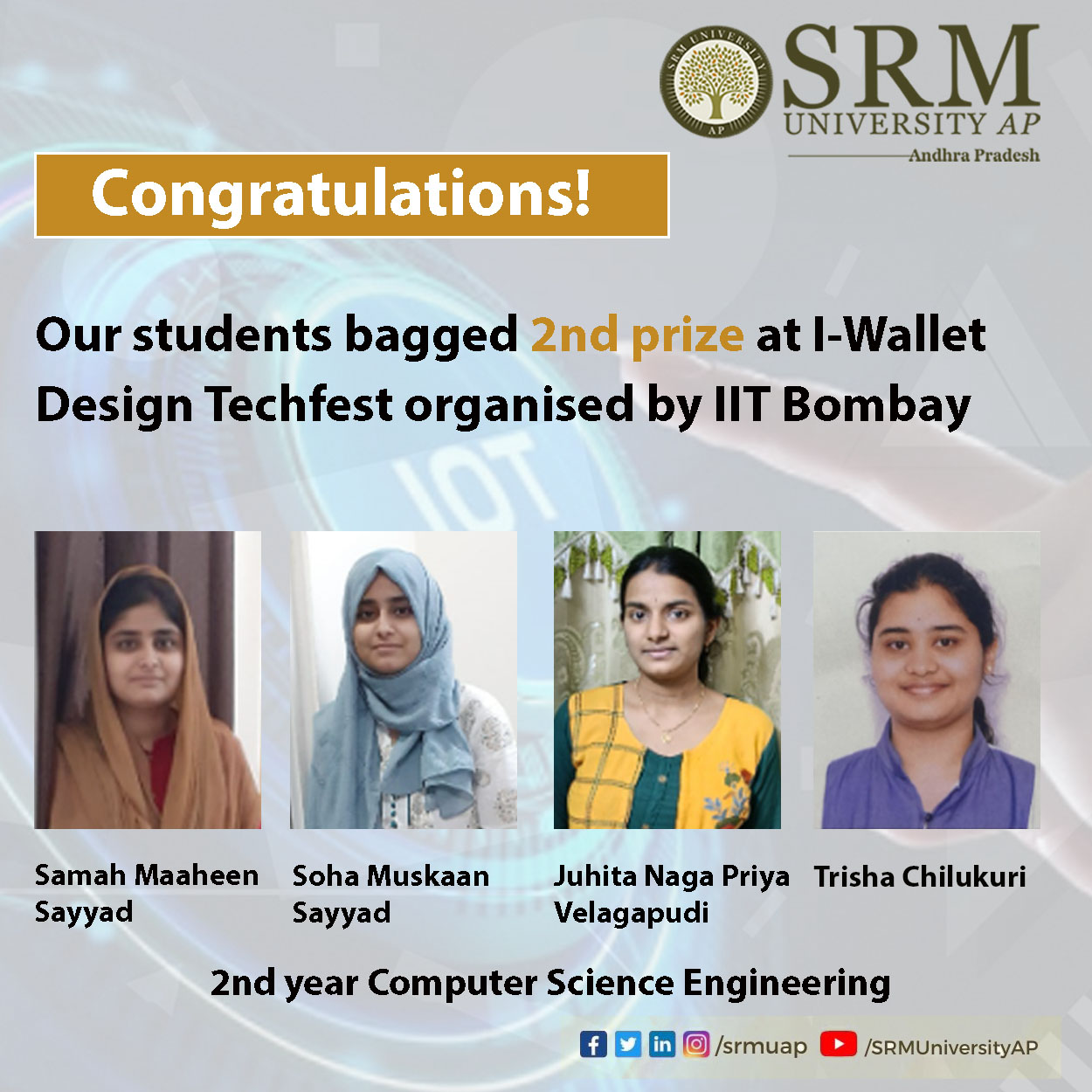 Soha Muskaan Sayyad, Samah Maaheen Sayyad, Juhita Naga Priya Velagapudi, and Trisha Chilukuri from 2nd-year Computer Science Engineering have achieved 2nd place in the I-Wallet Design Techfest, organised by IIT Bombay. Dr Sonam Maurya, Assistant Professor, Department of Computer Science and Engineering, guided the students to achieve this incredible feat.
Soha Muskaan Sayyad, Samah Maaheen Sayyad, Juhita Naga Priya Velagapudi, and Trisha Chilukuri from 2nd-year Computer Science Engineering have achieved 2nd place in the I-Wallet Design Techfest, organised by IIT Bombay. Dr Sonam Maurya, Assistant Professor, Department of Computer Science and Engineering, guided the students to achieve this incredible feat.The students started their work in December and explored a lot about IoT while working on it. More than 100 teams participated in this competition. In January, ten teams got selected for the second round, i.e., Report Submission, and our students were one of them. In February, based on the reports submitted, six teams, including our students, were selected for the final round, i.e., to present the proposed idea to the judges’ panel. Finally, the students bagged second place in the competition with cumulative prize money of INR 90,000.
Regarding the I-Wallet, students say that “Smart Wallet is an easy-to-use wallet that is designed for providing secured transactions”. It has minimal energy consumption, more security, and a few advanced features, some of which are not included in the regularly used wallets. The advanced IoT features enable it to be kept in our pockets with smartphones and smartwatches. The design received recognition from the expert panel members based on these features.
The team has also initiated the process to file a patent on the design of wallet. Students expressed their gratitude to Dr Sonam Maurya, Assistant Professor, Computer Science and Engineering, for her relentless guidance and continuous support towards the project. They also thanked SRM University-AP for providing the opportunity to participate in this national level competition organised by IIT Bombay.
Prof B V Babu, Dean, School of Engineering and Sciences, appreciated the students and their faculty mentors. “Keep up the good work, continue to excel in all your future endeavours at professional and personal levels and bring laurels to your alma mater”, he said in the congratulatory message.
Continue reading →



